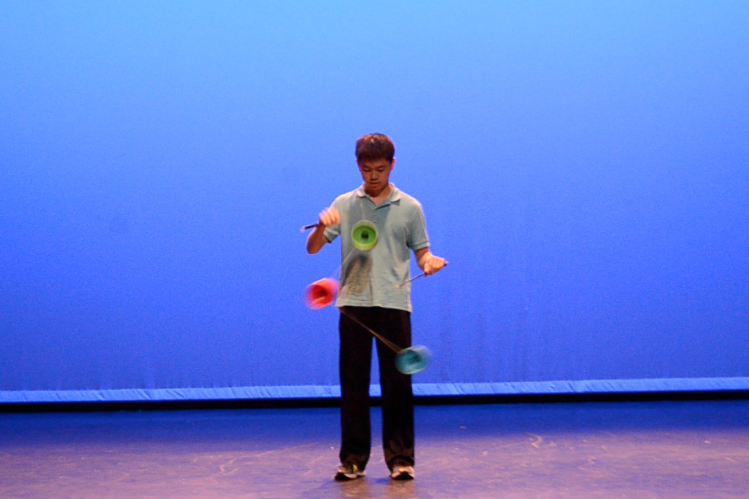Your donation will support the student journalists of Wayland High School. Your contribution will allow us to purchase equipment, cover our annual website hosting costs and sponsor admission and traveling costs for the annual JEA journalism convention.
Geoffrey Wang: It’s hard to get better if you don’t practice
February 14, 2017
The theater lights dim to a deep, mesmerizing blue, and the crowd’s cheer fades for a moment as one lone student walks onstage. After a couple moments of setup, he picks up his LED Chinese yo-yo and begins the performance. As each trick is performed perfectly in rapid succession, the full auditorium crowd roars with delight, jumping out of their seats to cheer the student on. At one point, the performer throws a yo-yo up into the air, and every eye in the auditorium focuses and follows its intricate movement in the air above the stage. Effortlessly, the performer catches the yo-yo onto the string. The audience roars again, shouting and throwing their arms in the air in earnest awe and disbelief.
Junior Geoffrey Wang began learning Chinese yo-yo, or diabolo, since the age of nine. One summer, his parents sent him to a weeklong summer camp, where he saw his first Chinese yo-yo performance on the first day of the camp. At the summer camp, the New England Chinese Youth Summer Camp, attendees are exposed to performances of all types of Chinese culture, but Wang was most interested in the yo-yo. So, when he heard that the yo-yo performer was teaching a class for the duration of the camp, Wang was very excited.
“I always had enjoyed watching other people play Chinese yo-yo, so I was eager to learn it myself,” Wang said.
In that first week, Wang learned the basics of yo-yo and some simple tricks. The teacher was a yo-yo master from Taiwan that the camp had invited over to America to teach. At the end of the camp, nine-year-old Wang performed yo-yo for the first of many times with the rest of the class.
“[That first week of camp] was where I got the inspiration to pursue yo-yo,” Wang said.
At the end of the camp, the teacher performed again, using three yo-yos on one string to complete tricks, or what Wang calls triple yo-yo.
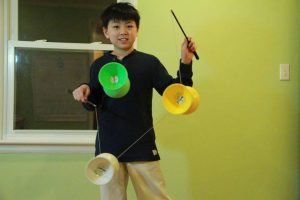
Pictured above is junior Geoffrey Wang practicing Chinese yo-yo as a young child. Wang began learning yo-yo at a summer camp at the age of nine. “Despite the frustrations, it lets me get away from everything else in life,” Wang said.
“No one really knew how hard it was [to do triple yo-yo] since he was [part of] the first generation of triple yo-yo performers,” Wang said.
After camp, Wang’s father bought two yo-yos from the summer camp, one for him and one for his son. With a yo-yo, Wang was now able to practice alongside his father. However, both Wang and his father knew that simply learning yo-yo on their own was impossible.
Thus, Wang’s father decided to make a deal with his son. If Wang could learn double yo-yo, two yo-yos on one string, by that December, Wang’s father would attempt to contact the original summer camp coach in Taiwan and visit him.
“I was a quick learner, so I was able to get double yo-yo by that December,” Wang said.
Wang’s father reached out to the summer camp yo-yo teacher, who invited the two to lessons in Taiwan. That winter break, Wang and his father packed their bags, yo-yos included, and flew the seventeen long hours to Taiwan for the first of several trips. There, Wang met with the teacher and received lessons from him for the duration of break.
However, since winter break was only one week, Wang and his father came up with a solution to maximize the lessons of the teacher.
“He would teach 20 to 30 tricks, and I wouldn’t be able to do any of them,” Wang said. “So, we recorded everything on video [and brought it back to the US to watch].”
At home, Wang would watch his recorded videos of the teacher and practice for an upwards of 30 minutes a day, attempting to master all of them. In addition to their recorded videos, Wang’s father found an online blog with YouTube videos of tricks for Wang to watch and learn.
“[The blogger] was like an internet teacher for me,” Wang said. “Lots of people learned from him at that time because he was the only real resource for people who lived outside of Taiwan.”
According to Wang, he mainly used the blog videos to improve his double yo-yo skill, an art that he had learned but not yet perfected. One year later, at the age of 10, Wang and his father returned to Taiwan to see the summer camp teacher again. At the time, the teacher was a wellness teacher at a local Taiwanese school.
“I believe it was the [Taiwanese students’] winter break as well, so I was able to have one or two private lessons [with the teacher],” Wang said.
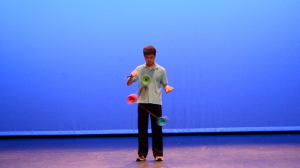
Wang performs a triple yo-yo trick, spinning three yo-yos around and into the air on a string.
Once again, Wang recorded all of the teacher’s lessons and tricks that he wasn’t able to learn in the week of break. However, this time around, Wang noticed a significant change in the margin of skill between teacher and student.
“Since [the original camp], he didn’t practice much,” Wang said. “So, he didn’t really improve as much as I did from when [I first saw him].”
Nonetheless, Wang still feels he learned some things that year from the teacher. In particular, the teacher was able to perfect his foundational yoyo skills and help him learn the smaller and easier double yo-yo tricks.
After that [second visit] to him in Taiwan, Wang said he hasn’t really learned much from the teacher. Rather, the teacher has become more of a practice partner for Wang.
“He’s [only been able to] teach me a few tricks here and then when we visit; we would mainly practice together,” Wang said. “He’s wasn’t a yo-yo teacher anymore and didn’t actively do Chinese yoyo.”
Upon returning home, Wang mainly turned to the YouTube blog and self-teaching to learn new tricks. A few years later, Wang’s dad planned one last trip to Taiwan for the two: A trip to another summer camp, this time taught by the best yo-yoist in the world at the time.
“It was really cool to meet [the teacher],” Wang said. “He was really good, and I went the camp specifically to learn with him.”
Wang recalled one interesting aspect of the cultural collision that he experienced at the camp.
“I was confused on why the students didn’t really take the camp seriously [because the teacher was number one in the world],” Wang said. “However, it makes sense now because Chinese yo-yo there is just like basketball here. They learn Chinese yoyo as a curriculum course.”
At the camp, Wang and his father once again recorded videos from the world-class instructor. Upon returning home, Wang’s father downloaded a software that allowed the two to go through each piece of footage in super slow motion.
“I spent hours looking at those clips and competition footage,” Wang said. “[I wanted] to dissect the tricks in slow motion.”
Even though the initial idea of learning yo-yo was spearhead by Wang, he noted that he is grateful to his father for playing a large role in the development of his talent.
“My dad helped by learning with me. He helps me understand what I do wrong and has helped me tremendously through this entire process,” Wang said. “He isn’t as good as I because he doesn’t practice that much, like how a coach normally isn’t as good as an athlete.”
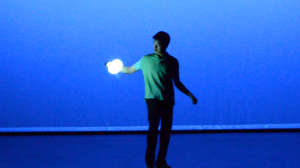
Wang performs with an LED Chinese yo-yo, a signature piece of his act that he brought back from last year’s talent show.
Wang said he often did not feel the hours passing by or his body weakening as he tediously worked on mastering a trick or learning a new skill.
“It’s something that I enjoyed a lot, so I would just keep on going,” Wang said. “I still enjoy it.”
However, as high school rolled around, Wang found his practice time decreasing as his homework load continued to increase.
“Now, in high school, I almost never practice,” Wang said, smiling. “[Especially] during robotics season from January to April, I don’t really ever get to practice.”
Despite not practicing often, Wang still gets to teach yo-yo at his weekly Chinese school, where he teaches the Chinese yo-yo class alongside his father.
“It’s something I enjoy,” Wang said. “It’s a fun course.”
Wang has 23 students in the class and only finds difficulty when students do not practice.
“It’s hard to get better if you don’t practice,” Wang said. “People who really want to progress and get better practice a lot. My father always says, ‘If you practice forever, you can learn any trick.’”
“So far, this has proven true for double and triple yo-yo tricks,” Wang said. “We’re waiting to see if it holds true for quadruple yo-yo.”
“To learn Chinese yo-yo, you learn small, individual tricks. But, to do that, you need to know the basics. For example, you need to be able to do double yo-yo and triple yo-yo,” Wang said. “People can try and teach you to accelerate the process and say ‘you’re doing that wrong,’ but because it’s [based on] reaction time, you need to get a feel for it by keep practicing. “
“It’s mostly self-practice; for the most part I taught myself,” Wang said. “I can’t say I fully self-taught myself, but I can say that double yo-yo, triple yo-yo and excalibur are all [based on] brute force learning. You’ve got to just learn them.”
Wang mainly focuses on practicing basics and new skills rather than tricks.
“My strategy is to learn the basics first and then learn tricks after that,” Wang said.
In Taiwan, however, there are a lot of experienced teachers who are able to push their students to learn double yo-yo and triple yo-yo quickly. There, Wang has heard of students learning triple yoyo within the first year and a half. Wang, a fast learner by the American standard, took three to four years to learn triple yo-yo.
“Because of their quick learning, their double yo-yo and triple yo-yo [foundations] aren’t solid,” Wang said. “So, they learn extra tricks [to make up for it].”
Wang first realized he was “good” at yo-yo the first winter, when he was able to learn double yo-yo in only two months and without a teacher.
“That was a big accomplishment on my part,” Wang said. “Everyone thought it was cool, and that the time I first saw progress [and realized that I was good].”
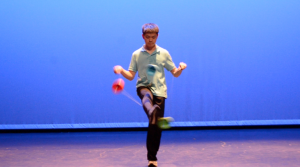
Wang performs a triple yo-yo trick at this year’s annual Winter Week Talent Show.
Wang believes there are two components to learning Chinese yo-yo: talent and hard work.
“If you have [both] talent and hard work, you progress really [quickly],” Wang said. “I was able to progress fast because of some talent and lots of hard work.”
Wang also knows others who are successful merely from hard work.
“They don’t have that much talent, but they practice a lot,” Wang said.
Wang’s current biggest goal is to learn quadruple yo-yo, a skill that only 50 people in the world know, according to Wang.
“[Quadruple yo-yo] is is my biggest goal. I think it’s up to 50 people in the world, maybe less.
The aspect of yo-yo Wang enjoys the most is being able to do the tricks.
“Some of the tricks are very satisfying. There’s a trick called ‘triple yo-yo feed the sun,’ and I could go off and do that for a long time,” Wang said. “Everything feels like it’s timed correctly. It just feels nice.”
“Practicing is the worst part. It get’s annoying when you’re learning triple yoyo or quadruple yoyo,” Wang said. “It’s years of doing the same thing and picking up yo-yos.”
“My style has been, once I get double yoyo, the next trick I do is triple yoyo. Most teachers and people don’t recommend this. It requires willpower,” Wang said. “If you go from double yoyo to triple yoyo, you don’t get any progress until you finish triple yoyo, which could be months or years.”
Wang often experiences this frustration and stress in his practice.
“Yo-yo is the most frustrating when one day you accomplish something big like getting three runs of four throws and catches, but then the next day, you can’t even get the yo-yo on the string,” Wang said. “There are also peaks sometimes. For example, one day I will make a lot of progress (twenty throws), and then in a week or two I will go back to [being] even worse than before. That’s really frustrating.”
To prepare for a performance, Wang first takes a piece of music and freestyles on it.
“If [the music] flows or grows in a certain direction, you do a certain trick to stay with the music the whole time,” Wang said. “I try to keep only interesting tricks and things that actually make sense.”
Wang also plays violin and alto saxophone and believes his musical experience has helped with his yo-yo choreographing ability.
After figuring out the sync with his music and the sequence of tricks based on that, Wang runs through the program multiple times.
“I practice sequences of tricks a lot [leading up to a performance], and if I have to take one part of a scale and put it in my performance, I [get to] know it better,” Wang said.
Specifically for the winter week show, Wang practiced for only one to two hours. This is because he already had a set sequence for several performances.
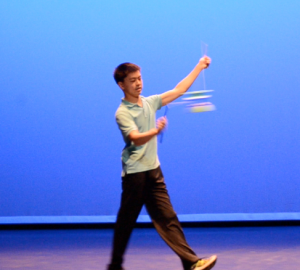
Wang performs the “Excalibur” trick at the 2017 Winter Week Talent Show. The trick involves swinging the yo-yo horizontally.
“It’s kind of something that I don’t have to practice anymore because if I’m trying to learn quadruple yoyo, I don’t have to stop to practice performance stuff because it’s easier for me,” Wang said. “[But] I [still] make sure I run it through; I [still] make sure I know what I’m going to do.”
Wang does not believe he will pursue yo-yo in the future for a living.
“Chinese yo-yo will always be a hobby for me. After triple yo-yo, it gets to the point where you can basically do everything,” Wang said. “There is a solid base of tricks that hasn’t grown since three or four years ago, and I know most of the tricks.”
“I feel like if you know the solid base of tricks, you can do a good performance,” Wang said. “[But], if you want to [do well] at a competition, you need to know the extra tricks [that people have invented]. But, I never intend to learn the extra tricks [or go compete].”
For Wang, at the end of the day, yo-yo will remain a lifelong outlet from the stresses of daily life.
“If I ever get time and I’m not doing something else, I like to pick up my yoyo,” Wang said. “It’s something that I just do. Despite the frustrations, it lets me get away from everything else in life.”
